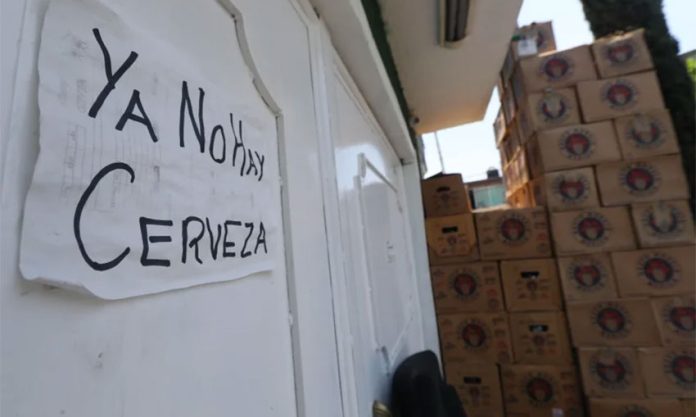As the country faces another month of quarantine, a new crisis looms on the horizon: Mexico is running out of beer.
Hoping their stocks would last through to the end of the quarantine, beer companies began halting production in early April in response to the government’s classification of alcohol as a nonessential agro-industrial product.
But now that the emergency period has been extended to the end of May, small business owners who depend on beer sales for as much as 40% of their revenue are starting to feel the economic pinch.
“We’re now seeing what was more or less obvious. The inventories in the warehouses are running out and there’s no new production,” said Cuauhtémoc Rivera, president of the National Alliance of Small Business Owners (Anpec).
The alliance urged the federal government to classify beer as an essential product in early April to avoid the very situation small shop and convenience store owners now face.
“There’s no beer because there’s no production. They closed the plants because of the disease,” said Emilio, a Mexico City shop owner with a few lonely cans of less popular brands of beer left in his refrigerators.
A couple of blocks away, Alejandro runs a beer distributor that normally stocks 150 businesses in the neighborhood. He has gone from selling 1,000 cases a week to zero and now a sign hangs over the door reading, “No beer.”
“It’s hitting us real hard because beer is what we sell most. Now that we don’t have any, it obviously hurts us. My business supports eight families,” he said among mountains of empty bottles.
Even larger grocery stores are starting to see stocks run low, and the scarcity is being felt at the cash register, as beer prices have risen around 30%.
“Before, I got a case for 380 pesos (US $15.40). Now I get one for 600 pesos (US $24.32),” said Omar, who runs a michelada street stand in Mexico City.
Data published by the federal statistics institute Inegi reveal that around 65 million Mexicans drink beer, and that each of those consumes an average of 68 liters of the brew annually. But Mexicans’ intimate relationship with beer has had a rocky month, as news of halted production and dry laws triggered panic buying at the beginning of the emergency period.
Although Mexico is the world’s largest exporter of the beverage — cornering almost 27% of the global beer market — the federal Health Ministry has made it clear that the product is not essential, even after the Agriculture Ministry invited beer manufacturers to resume production in early April.
“The beer supply is a problem,” said Juan Fonseca of Femsa, owner of the Oxxo convenience store chain. “Currently we have stock from [Heineken and Grupo Modelo], … but they’re not currently producing.”
He said on Thursday that Mexico’s 19,344 Oxxo stores have enough beer to last them the next 10 days, but many small businesses and distributors like Alejandro’s in Mexico City are already out of stock.
A possible consequence of such a prohibition is a black market for beer, which the Confederation of Industrial Chambers (Concamin) fears will grow as the pandemic stretches into May.
“There’s a lot of beer arriving [on the market],” said Concamin vice president Alejandro Malagón. “Our greatest worry is that there is a market for imported beers that is taking a space, but we don’t know if they are temporary imports or contraband.”
Sources: El Imparcial (sp), Milenio (sp)
